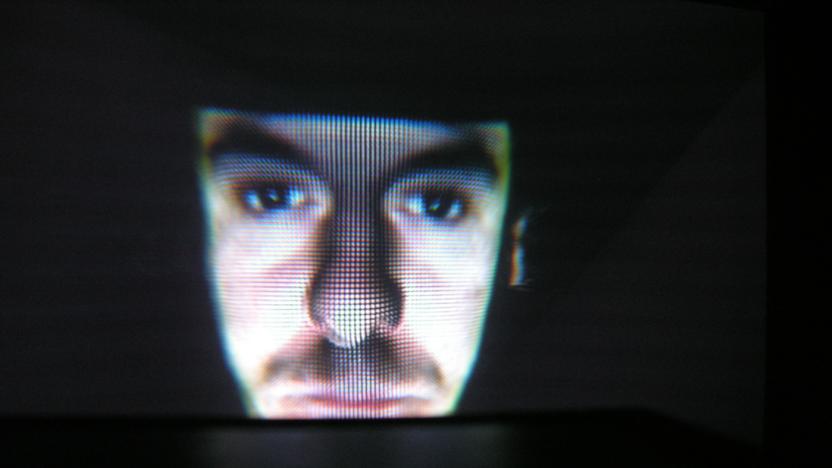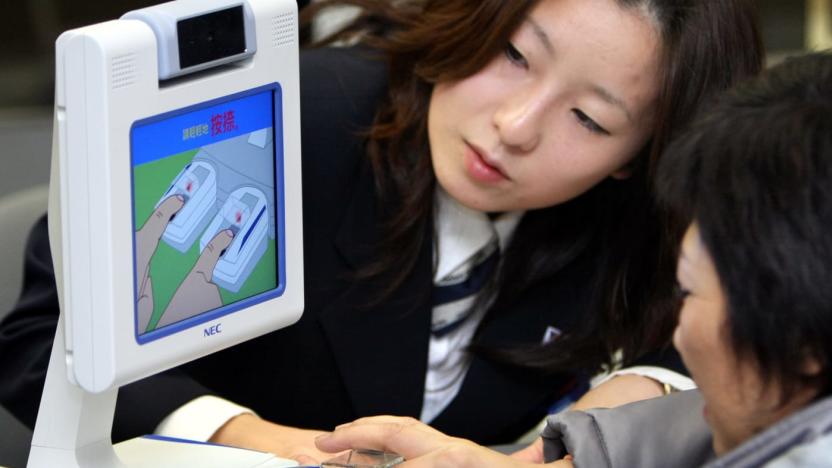biometric
Latest

Synaptics' under-glass fingerprint reader is almost here
It was just a month ago when LG Innotek unveiled its under-glass fingerprint sensor, but it's clearly not the only company working on this space. At Computex, the folks over at Synaptics were kind enough to let me take a sneak peek at a similar technology that they've been working on for two years. For some reason, photography was forbidden, but the prototype was simply a special glass trackpad -- with extra details which I am not at liberty to disclose -- retrofitted into an existing laptop. It'll essentially be a spiritual successor to Synaptics' SecurePad (pictured above), but rather than having to cut a hole through the trackpad, the next-gen fingerprint sensor will simply sit underneath the glass layer, so that when it's idle, you can still use the entire trackpad area for the usual cursor and gesture controls.

Senator behind biometric privacy act tries to remove its teeth
The Illinois Biometric Privacy Act became law in 2008, making it illegal in the state to capture a person's biometric identifiers -- things like fingerprints, iris scans or faceprints -- without explicit consent. This has led to three lawsuits against Facebook, Google and Snapchat, each over the companies' use of face-scanning or -tagging technology. Now, Illinois State Senator Terry Link is attempting to add language to the bill that would make these practices legal in the state, effectively ending the lawsuits, The Verge reports. Note that Link is the senator who originally introduced the Illinois Biometric Privacy Act.

LG's phone fingerprint sensor doesn't need a button
Existing phone fingerprint readers are less than ideal. When they're on the back, you can't sign in while the phone sits on your desk; on the front, they chew up valuable device real estate; on the side, they're tiny. That's where LG Innotek might just come to the rescue. It developed a fingerprint sensor that hides just under the cover glass on a mobile device, saving space while giving your digits an easy target. On top of that, it can actually be more effective than a dedicated button. It's extremely accurate (the failure rate is just 0.002 percent), and the stealthy approach protects the reader against scratches and water.

Japan wants tourists to pay using only their fingerprints
The next time you travel to Japan, you might not have to stock up on yen (or bring your credit card) to go shopping. As of the summer, the country's government is testing a system that will let you use two fingerprints to make purchases at key tourist locations, such as hotels and restaurants. You'd only have to register your fingerprints at the airport to start shopping, and you wouldn't even have to worry about showing your passport when checking into your lodgings, like you do today. Only 300 locations in a handful of areas (Atami, Hakone, Kamakura and Yugawara) will participate at first, but it should keep expanding to the point where it's available nationwide in 2020 -- conveniently, right when Tokyo is hosting the Summer Olympics.

TalkTalk's customer helpline now uses voice authentication
The days of digging out that grubby Post-it note with your telephone account password scrawled on are over for TalkTalk customers. From today, you'll only need your vocal cords to prove you are who you say you are. That's because TalkTalk has introduced biometric voice authentication on its customer services helpline, in what's said to be the first implementation in the UK outside of the financial industry.

Scientists can identify terrorists by their victory signs
To no one's surprise, many terrorists aren't willing to divulge their identities -- they'd rather cover themselves head-to-toe than risk a drone strike or police bust. Researchers, however, may have made it that much harder for these extremists to hide. They've developed a biometric identification technique that can pinpoint people by the V-for-victory hand signs they make. By measuring finger points, the gap between them and two palm points, scientists can identify someone even when there are no other telltale cues. In some cases, it was more than 90 percent accurate.

Google's creepy plan to kill the password
In the grab bag of Google/Alphabet's big projects for 2016 is Project Abacus. It's basically the company's plot to kill the password in cold blood, by replacing it with smartphone user authentication via an uncrackable collection of biometric readings. Abacus would lock or unlock devices and apps based on a cumulative "trust score" -- as your phone continually monitors and recognizes your location patterns, voice and speech patterns, how you walk and type, and your face (among other things). Like many things Google, it sounds miraculous. Your phone will just know it's you. And infosec pundits who believe we're stuck in password-hell Groundhog Day because "regular" people won't do security if it's inconvenient, will rejoice.

California police use these biometric scanners
Police are increasingly turning to biometric tech in the field. It's supposed to help cops verify the identity of suspects, but there's a real concern that they could abuse this to get personal details on record -- and the Electronic Frontier Foundation wants you to know when this hardware might come into play. The rights group has published a report detailing the biometric scanners in use by California law enforcement, and they're in more widespread use than you might think. Mobile fingerprint readers are in use at several departments, and face recognition is getting traction. The Los Angeles County Sheriff's Department is using tattoo recognition, and some police departments are looking into iris scanning.

Here's what you need for a fingerprint reader in Android Marshmallow
Google made sure that the Nexus 5X and 6P take advantage of Android Marshmallow's fingerprint reader support, but have you wondered what it'll take to get that digit scanning support in third-party hardware? You don't have to guess any longer. Google has listed the requirements for fingerprint readers in its latest platform, and they're unsurprisingly quite strict. The reader's false acceptance rate has to be virtually non-existent, and the rejection rate should be less than 10 percent. It also needs a hardware-based approach to matching fingerprints, and it must be impossible to access that data outside of the chip. Clearly, Google doesn't want a repeat of the lax security that made it easy to steal fingerprint data from some earlier Android phones.

OPM hackers took more fingerprint data than first thought
It's safe to say that the Office of Personnel Management data breach was already bad news for government workers, but things just got a bit worse. The agency now estimates that the intruders took the fingerprints of 5.6 million people, not the originally determined 1.1 million. Yes, that's five times more than first thought. Officials are quick to note that this digit data won't be as useful to the hackers as the other sensitive information leaked through the attack (fooling a fingerprint reader requires some skill). However, there's a concern that the thieves could find a way to misuse those prints -- and it's not as if you can change your fingers once they've been compromised. While there's no immediate reason to panic if you've worked for the feds, there could be additional trouble down the road. [Image credit: Bloomberg via Getty Images]

Standalone scanner keeps your prints out of hackers hands
The ease with which hackers seem able to access password secured computer systems including airlines, major corporations -- even the White House -- it's little wonder that the security community is scrambling for alternatives. But even biometric locks that scan our irises, faces, and fingerprints can be broken if they're connected to a compromised computer. That's why Synaptics has developed a fully self-contained fingerprint scanner.

Japanese smartphone gets iris-scanning for mobile payments
The common objection to using your phone for purchases is that any sufficiently-motivated criminal could lop off your thumb and go on a spending spree. That's one of the reasons why Japanese carrier NTT DoCoMo and Fujitsu have teamed up to unveil the Arrows NX F-04G. The pair say that it's the world's first smartphone with iris recognition technology that can be used to both unlock a device and certify mobile wallet payments.

Windows 10 log-in options will include fingerprint, facial and iris recognition
Microsoft thinks it's high time you ditch your passwords. The company, which is readying Windows 10 for release later this year, just announced that its next-gen OS will include built-in support for several alternative log-in options, including fingerprint, facial and iris recognition. That means so long as a Win 10 machine has at least one of the necessary sensors -- a fingerprint reader, eye scanner or illuminated IR sensor for facial recognition -- there will be a built-in framework called "Hello" that helps users enroll their fingerprints, or face, or what have you. In other words, then, regardless of who made your machine (Acer, HP, et cetera), you'll get a consistent user experience for setting up a biometric log-in.

Delaware wants to put your driver's license on your phone
For all the recent talk of moving to digital wallets, you can't really ditch the old-school kind yet -- you still need to carry physical copies of your driver's license and other forms of ID. If you live in Delaware, though, you may eventually have one less reason to worry when you leave your purse or wallet at home. The state's Senate recently passed a resolution asking the Division of Motor Vehicles to research a digital driver's license that you would store in an app on your phone. While many of the details still have to be worked out, you'd use some kind of biometric security (such as your face, fingerprint or voice) to get access on top of a code. There's no timetable for when Delaware would test these licenses, but it may not take long given that the state's development partner, MorphoTrust, has been working on the technology for a while.

Uber explores using biometrics and lie detectors to screen drivers
Uber has come under fire for allegedly doing little to protect passengers from unscrupulous drivers, and it's determined to improve that reputation -- in some cases, using relatively unusual methods. The ridesharing company's recently hired Head of Global Safety, Philip Cardenas, tells customers that Uber is exploring numerous techniques for verifying drivers, such as biometrics, voice fingerprinting and lie detector tests. "Scientific analysis and technology" should help make up for gaps in background check infrastructure around the world, Cardenas says.

Hexoskin's new wearable is a smart shirt for exercise buffs
The wearable craze isn't only about fashionable watches and savvy glasses. After all, remember how tech giant Intel's vision for the space included a shirt? Hexoskin, a Canada-based startup, has similar beliefs, and that's why it recently introduced its biometric smart tee -- Ralph Lauren's doing it too. The newly developed shirt, aimed at people who are fond of exercising regularly, is equipped with sensors capable of tracking over 42,000 data points every minute. Naturally, given that Hexoskin designed its product with athletes in mind, the shirt's bread and butter is to gather stats during physical training sessions, although it can also track daily activities such as sleep. Unfortunately, Hexoskin's wearable is only available in the US at the moment, where the starting kit sells for a cool $399.

Test code hints at future iPads with Touch ID and Apple Pay
There have been photos and vague rumors hinting that Apple's next iPads will involve more than just a speed bump, but there hasn't been much in the way of hard evidence... until today, that is. Hamza Sood has uncovered code in the iOS 8.1 developer beta that alludes to unannounced iPads with Touch ID fingerprint readers and, appropriately, Apple Pay support. Don't think that you'll be tapping your iPad to pay for goods at the local shop, however. From all indications, this is just for in-app transactions; there's no mention of NFC. It's also unclear when this new iOS version will arrive, although history suggests that the new iPads (and thus the finished 8.1 update) could surface in October.

Barclays wants you to give it the finger instead of a PIN
PINs, passwords and authentication codes: they're a troublesome security solution that we'd love to see the back of. The bankers at Barclays know this, so they've looked to biometrics in a bid to banish them forever. Today, the company announced that it's teaming up with Hitachi to launch a new reader capable of scanning and recognising the unique vein patterns a customer's hand. It'll let you scan your finger to quickly access your online bank accounts and authorise payments, reducing fraud in the process. Hitachi's Finger Vein Authentication Technology does the hard work and is said to be significantly harder to spoof because it'll only work if the scanned finger is "attached to a live human body" (no finger-lopping movie plotlines happening here). Barclays' Biometric Reader will roll out first to business account holders from next year, but staff at UK branches may ask you to put your best finger forward in the very near future.

Samsung plans to bring biometric security to its low-end phones
The Galaxy S5 was widely tipped to launch with iris-scanning capabilities. When the crunch time came, Samsung played safe with only fingerprint sensor support. According to the Wall Street Journal, the eye-centric tech is still on the company's radar and could soon debut in new high- and low-end phones alike. "We're looking at various types of biometric [mechanisms] and one of things that everybody is looking at is iris detection," Samsung executive Rhee In-jong admitted today, adding that it would likely be included in flagship smartphones first. Like fingerprint recognition, iris scanning would likely form another link in Samsung's Knox platform, putting it in good stead with big organizations like the US government. Samsung's desire to "follow the market trend" often causes it to beat rivals to market with features that customers rarely use. Iris scanning could well be the next example.

Your fingerprint unlocks LastPass on the Galaxy S5
On any other phone, you'd have to type in the master password to access all your other passwords stored on LastPass -- including the iPhone, where Touch ID gets you into your phone and iTunes account, but stops there. But on Samsung's Galaxy S5, all you need to do is swipe your finger across the home button, now that the password manager's Android app has been updated to work with the device's biometric scanner. To set that up, you'll first need to type in your credentials like everyone else, and then activate fingerprint authentication for future use. It'll be a lot faster to add or change entries with the feature in place, and in some ways, fingerprint authentication is more secure than using a complex master password. We just hope you have no bitter enemies that'll go as far as to make a fake finger to sabotage your digital life.










